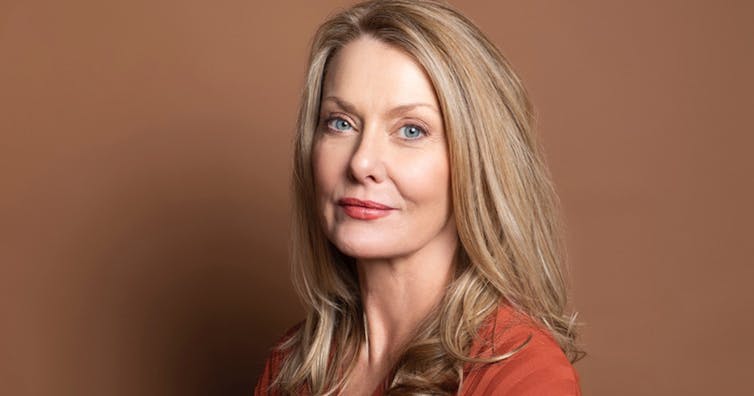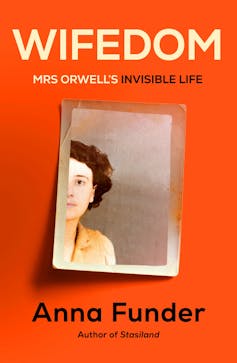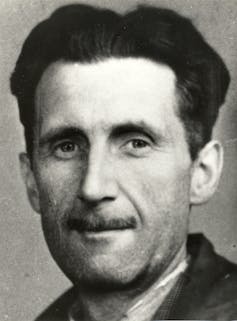In the summer of 2017, Anna Funder found herself “at a moment of peak overload”. Juggling the competing demands of getting her children ready for the new school year, grocery shopping, home maintenance and caring for members of her extended family, Funder felt she had been spiritually drained by the monotonous demands of motherhood.
After stumbling across a copy of Orwell’s collected essays in a secondhand bookshop, she embarked on a project of re-reading his work, hoping his explorations of tyranny would help her liberate herself from the “motherload of wifedom I had taken on”.
Review: Wifedom: Mrs Orwell’s invisible life – Anna Funder (Hamish Hamilton)
A few months later, disappointment struck in the form of a derogatory diary entry about his first wife, Eileen O’Shaughnessy. In it, he complains of women’s “incorrigible dirtiness & untidiness” and of a “terrible, devouring sexuality” which causes every wife to “consciously [despise] her husband for his lack of virility”.
The accusations about women’s sexuality are somewhat confounding when they come from a man who, as Funder reveals, was himself a sexual predator. But as she observes, they reveal that he “sees women – as wives – in terms of what they do for him, or ‘demand’ of him. Not enough cleaning; too much sex.”
Curious about how Orwell’s misogyny has been interpreted, Funder consulted a series of biographies written by men, only to find it is perennially excused
by leaving it out, sympathising with the impulse, trivialising it as a “mood”, denying it as “fiction” or blaming the woman herself.
In her anger, Funder births another project, moving “from the work to the life, and the man to the wife”.

Motherhood and #MeToo
Wifedom examines Eileen’s life, interrogating the omissions and inaccuracies about her achievements and her partnership with Orwell that pepper the literary and historical records.
It is composed of two narrative strands: the first, set in the present, is in Funder’s voice as she investigates Eileen’s life while also navigating the pressures of motherhood and the revelations of the #MeToo movement.
The second is written in the third person and reconstructs scenes from Eileen’s life. Funder reads between the lines of Orwell’s work and the biographies of him to get the measure of Eileen’s contribution to his success.

She also draws on a cache of letters between Eileen and her best friend Norah Symes, discovered in 2005 after seven major biographies of Orwell had already been written. In her recreations, Funder quotes these letters in italics, foregrounding not only Eileen’s perspective, but also her intelligence, warmth and wit.
While it would be reductive to characterise this book solely as a product of the ongoing #MeToo reckoning, the movement influences Funder’s project in significant ways. As she alighted on the idea of studying Eileen, she found herself having conversations with her children about the media’s reporting of #MeToo stories and reflecting on her own experiences of sexual harassment with a new clarity – “a liberation, like the outing of ghouls”.
Funder also finds herself contemplating how she ended up bearing the lion’s share of work on the home front.
She does not blame her husband, whom she characterises as “emotionally astute” and “deeply engaged with our children”; rather, she acknowledges that while the “individual man can be the loveliest”, the “system will still benefit him without his having to lift a finger or a whip, or change the sheets”.
Read more: Sharing the parenting duties could be key to marital bliss: study
Patriarchy: then and now
Wifedom is a meditation on the insidious nature of patriarchy. Funder draws productive parallels between her own time and Eileen’s – without sacrificing the historical specificity of either.
Reflecting on her own life, Funder realises she
can count on one hand with fingers to spare the number of heterosexual relationships I know in which the man creates the domestic and other conditions for the woman to enjoy her time in life to an equal extent as she does for him.
This observation captures Eileen’s fate; a talented writer with a masters degree in psychology, she becomes a taken-for-granted helpmeet when she marries Orwell. She types his manuscripts in between looking after their chickens, unblocking the toilet and preparing all their meals. She also deals with their mice infestation, as he finds the rodents too repulsive.

While Orwell heavily relied on Eileen for his literary output, her labour remains invisible. Funder emphasises this point by examining the silences in Orwell’s Homage to Catalonia, which she has admired since she was a teenager.
Eileen was also in Spain. She types the observations Orwell sends her from the front and sends him back provisions. She works at the Communist Party’s headquarters, and the information she gleans informs Orwell’s account of the war. When Orwell is shot, she travels to the front to retrieve him, nurses him and organises his medical care.
Orwell, however, barely acknowledges her presence in his account. He refers only a few times to “my wife” – as though she were a tourist lounging in a hotel – and consequently, it is possible to read Homage without realising she was there at all. She is, Funder observes, a negative presence in the book, “like dark matter that can only be apprehended by its effect on the visible world”.
Orwell as predator
A more disturbing aspect of Funder’s interrogation of Orwell’s personal life is her revelation of his predatory behaviour. She documents his numerous attempted rapes of female acquaintances, as well as his manipulation of Eileen throughout his infidelities.
In 1940, as Eileen was grieving the death of her brother, Orwell penned a letter to an old crush, a teacher named Brenda who had refused his advances on multiple previous occasions. In it, he attempts to persuade her he has Eileen’s blessing to pursue an affair – a blatant lie.
Funder refutes the claims of several biographers who have argued this was a “clumsy attempt to establish a ménage à trois”. She draws on Eileen’s own letters to demonstrate Eileen despised Orwell’s pursuit of Brenda and wanted no part of it.

Funder’s reassessment of Orwell’s writing in relation to his biography reminded me of a recent essay by the academic Mary K. Holland, which reappraises scholarship on David Foster Wallace. Holland contends that prior to the #MeToo movement, the academy was unwilling to consider the obvious link between the misogyny and violence Wallace meted out in real life, and the “rape culture” that “so much of his fiction considers or reproduces”.
In Wifedom, Funder mounts a similar argument against Orwell, shedding new light on his work: though he is renowned for his examinations of power, his writing never considers power relations between the sexes.
Perhaps this is why, despite his commitment to documenting the lives of the impoverished and disempowered, he still felt entitled to purchase sex from a young girl in Morocco (as Funder documents), and remained ignorant of the demands he made on his wife’s time and abilities.
In all likelihood, Eileen recognised Orwell’s gendered blind spot, referring in one letter to his “extraordinary political simplicity”.
This leads to the book’s ironic denouement, in which Funder contends that patriarchy is the ultimate doublethink: “the whole world was set up to allow men to treat women badly, and still think of themselves as decent people”.
Interrogating Orwell’s legacy
Funder is clear that she doesn’t want to “cancel” Orwell – though she notes that Eileen “has been cancelled already – by the patriarchy”.
Rather, the value of her project lies in considering their two lives, side by side: “looking for Eileen involved the pleasure of reading Orwell on how power works, and "finding her held the possibility of revealing how it works on women: how a woman can be buried first by domesticity and then by history.”

This kind of reckoning is especially urgent at a time when the term “Orwellian” is regularly invoked in discussions about politics. While this descriptor is often used in inaccurate and contradictory ways, arguably Orwell’s stature as a political commentator has increased with the ascendancy of Trump and his imitators.
Funder is the perfect writer to integrate Orwell’s legacy. She, too, has devoted her writing life to the subject of surviving tyranny. First in Stasiland, which documented surveillance and repression in East Germany. Then, in her Miles Franklin award-winning novel All That I Am, which centred on the strained loyalties of a group of Nazi dissidents.
But Orwell placed himself in extreme situations in order to report on poverty and war. Whereas Funder is searching for a way to understand the experiences she has garnered simply by virtue of existing – as a woman, in a world designed to benefit men.

